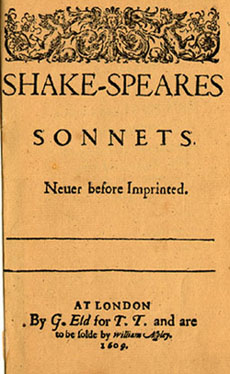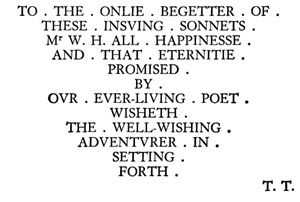 |
|||
 |
|||
SHAKESPEARE'S SONNETS
The Mystery:
 |
|||
 |
|||
Shakespeare early in his career, around the time of Romeo and Juliet, began to write would what become a154 sonnet sequence: what do we have as Romeo greets Juliet:
Romeo: If I profane with my unworthiest hand
This holy shrine, the gentle fine is this:
My lips, two blushing pilgrims, ready stand
To smooth that rough touch with a tender kiss.
Juliet: Good pilgrim, you do wrong your hand too much,
Which mannerly devotion shows in this;
For saints have hands that pilgrims' hands do touch,
And palm to palm is holy palmers' kiss.
Romeo: Have not saints lips, and holy palmers too?
Juliet: Ay, pilgrim, lips that they must use in pray'r.
Romeo: O, then, dear saint, let lips do what hands do!
They pray; grant thou, lest faith turn to despair.
Juliet: Saints do not move, though grant for prayers' sake.
Romeo: Then move not while my prayer's effect I take
For a sonnet sequence, think TV mini-series, about which questions abound
1. Who is Mr. W.H.?
2. Who is the "friend" mentioned?
3. Who is the "dark lady"?
4. Who is the rival poet?
4. To whom are the sonnets dedicated?
6. What if all the sonnets are not dedicated to a woman? (So Sonnet 20):
A woman's face with Nature's own hand painted
Hast though, the master/mistress of my passion;
A woman's gentle heart, but not acquainted
With shifting change, as is false women's fashion;
An eye more bright than theirs, less false in rolling,
Gilding the object whereupon it gazeth;
A man in hue, all hues in his controlling,
Which steals men's eyes and womne's souls amazeth.
And for a woman wert thou first created,
Till Nature as she wrought thee fell a-doting,
And by addition me of thee defeated,
By adding one thing to my purpose nothing.
But since she pricked thee out for women's pleasure,
Mine be thy love, and thy love's use their treasure.
7. What kind of language predominates in the so-called WILL sonnets (135 for example):
Whoever hath her wish, thou hast thy Will,
And Will to boot, and Will in over-plus;
More than enough am I that vexed thee still,
To thy sweet will making addition thus.
Wilt thou, whose will is large and spacious,
Not once vouchsafe to hide my will in thine?
Shall will in others seem right gracious,
And in my will no fair acceptance shine?
The sea, all water, yet receives rain still,
And in abundance addeth to his store;
So thou, being rich in Will, add to thy Will
One will of mine, to make thy large will more.
13. Let no unkind, no fair beseechers kill;
Think all but one, and me in that one Will.
Your project is in two parts:
PART ONE:
Discover how the sonnet came to England--who introduced it and from where did it originate? Identify the two sonnet types, noting differences in form. (Remember that we have done one of the two types already in class.) Did one type evolve to the other? What poets were involved in the transmission of the sonnet from Europe to England? .
For each of the types, indicate the following:
PART TWO:
Provide an analysis of one sonnet from each type to show:
SOURCES:
PRINT RESOURCES:
NOTE THAT THE FOLLOWING BIOGRAPHICAL-SONNET SUMMARY MAY BE OF USE, AND THAT THE SEQUENCE HAS BEEN REARRANGED TO TELL A 'STORY' This is a critical hypothesis, and does not necessarily reflect the reality of what may or may not have happened in Shakespeare's life.
Note that the recent biographies of Shakespeare offer evidence that the sonnets and plays indeed reflect significant autobiographical moments. See especially: Stephen Greenblatt: Will in the World: How Shakespeare Became Shakespeare. N.Y.: W.W. Norton, 2005. Greenblatt also authored Hamlet in Purgatory which argues for a Catholic ghost. For a counter argument, see my Hamlet and The Daemons.
Older bibliographical sources: (Note how their views of the sonnets conflict...)
Bloom, H. Shakespeare: The Invention of the Human. N.Y.: Riverhead, 1998.
Campbell, O. The Sonnets, Songs and Poems of Shakespeare. N.Y.: Bantam, 1964.
Rowse, A.L. William Shakespeare: N.Y.: Harper and Row, 1963.
Schoenbaum, S. William Shakespeare: A Compact Documentary Life. N.Y.: Oxford University, 1977.
ON LINE RESOURCES:
1--from Mr. William Shakespeare and the Internet (an on line bibliography for the sonnets.) (click here)
2--the full texts of Shakespeare's sonnets (click here)
3--Shakespeare Web sites on the SJC page (click here)
4- A link to the Sonnets with extensive analysis and commentary (click here)
Two perspectives follow: The first, and most recent, is Greenblatt's followed by Campbell's:
1. Greenblatt guardedly supports Southampton in the procreation sonnets: 1-17, (p. 230), but acknowledges the William Herbert perspective, but adds: "...no one has been able to offer more than guesses..." (p. 232). He believes in sum that perhaps both men may have been on Shakespeare's mind depending on what sonnets one reads.
2. He finds Shakespeare's addressing them to a man unusual since the convention mandated a women as the usual subject: "The palpable air of a young man in love with himself and, above all, the sexual ambiguity make the painting [of Southampton] - which had long been mistaken as the image of a woman- serve as a vivid illustration of the qualities Shakespeare was addressing..." (p. 231-232) {Instructor note: Da Vinci Code?}. This is the portrait that appears in Greenblatt's study:

3. Greenblatt, p. 233 ff, suggests perhaps a latent homosexual attraction. (Instructor note: This view has been strongly contested by other biographers.) Importantly, however, he notes, (p. 235) that in the Renaissance, bonding with a male, whether actual or 'platonic,' was considered more sublime than with a woman whose love was considered more fickle. See Sonnet 20.
4. Interestingly he note, the Sonnets are not addressed to his wife, but to one or both of the male patrons and the mysterious "dark lady." What does he feel subconsciously about his family?
The following (based on Campbell) is simply a hypothesis offering a biographical interpretation of Shakespeare's sonnets; it is not presented as a definitive interpretation and may be subject to dispute. The print and on line resources will offer differing interpretations.
There are two possible answers to the W.H.:
1. Henry Wriothesley (third Earl of Southampton)
2. William Herbert (third Earl of Pembroke)
Investigate these and find out which one is the more likely candidate and why. See the sonnet packet and sequence attached to this packet.
The dark lady has often been identified as Mary Fitton, a maid of honor to the queen.:
1. What are the reasons for this assumption?
2. What is her relationship to one of the men mentioned above?
SONNET SEQUENCE CHRONOLOGY (as suggested by Campbell)
It is conjectured that Shakespeare began to write the sequence in response to Pembroke's parents who wished him to marry a girl (Elizabeth Carey) at age 14. (This age was not uncommon for Elizabethan nobility).
Sonnets 1-17
The first group addressed to the young Lord William Herbert. These are called the procreation sonnets in which the boy is urged to marry so that his beauty may be preserved for future generations.
Sample sonnet 4:--locate on the Internet
Sonnets 18-26
This group enlarges the friendship between Shakespeare and the young man. It must be remembered that although the word "love" is used and there are some sexual references, it was not uncommon in the Renaissance for men to write of friendship in this sense, and it does not necessary imply homosexual connotations, although...
Sample sonnet : 18--locate on the Internet
Sonnets 127-132
Note that the chronological order is interrupted in order to provide the proper development of the story. The poet writes in praise of the dark lady, but comes to admonish his lust after the seduction takes place. He may not be aware at this time of the relationship between the dark lady and William.
See sample sonnet 130--locate on the Internet
Sonnets 27-47
After the poet has returned from a trip, he discovers the relationship between Herbert and the dark lady and is jealous. Sonnet 4O suggests that the young man had another sexual adventure with the dark lady; the poet manages to rationalize this by writing that since he and his friend ere really one soul in two bodies, the dark lady in reality is really loving him.
See sample sonnets 29 and 40:--locate on the Internet
Sonnets 133-142--locate on the Internet
Here the poet is especially upset with the dark lady, accusing her of attempting to seduce his friend William. This he certainly regards as an unnecessary seduction since apparently she is open to all men who want her. There are signs that despite what he feels for her in his heart, he must suffer for allowing his emotions to govern passion, and thus his spiritual recovery has begun, but not without thoughts of a frankly sexual nature:
See sample Sonnet 135:--locate on the internet, and note the puns on the word "WILL".
Sonnets 48-66--locate on the Internet
In despair, the poet writes of mortality and the disloyalty of friends.
See sample sonnets 55 and 58--locate on the Internet
Sonnets 67-108--locate on the Internet
The poet attempts to persuade his friend to abandon his wild ways, and will use his poetry to accomplish the task.
See sample sonnet 73:--locate on the Internet
Sonnets 143-152--locate on the Internet
The poet wishes her to show him kindness, but is still attempting to banish her from his thoughts.
See sonnet 146 and 147:--locate on the Internet
Sonnets 109-126:
The poet explains how the friendship with William can be secured:
See sonnet 126--locate on the Internet
Conclusion:
I agree with his read of Sonnet 18. Regardless of what biographers might find in the future, the sonnet's transcendent power matters most. (p.238), and regardless of the identity of the men and women not direclty named, including his family, what matters is that the poetry has survived and presents ideas the poet obviously found significant. My Shakespeare class offered the following:
Self-respect an issue
Good political observer
Rebellious nature-neglected by father
Knew too much to be a high school grad. only
Obsessed with death--his son @ 11
Knew how to get around things: / rebellion / marriage
Male centered--resented women
Saw corruption up close
For Hamlet--the catholic viewpoint
Fits of depression
Hard worker / wanted money
Later--he knew he was good--knew how to please the crowd
I added the following:
Not a university educated professional
Romantic and pragmatic
Hard headed businessman
Made his own rules
Used sonnet conventions but added his own perspectives
Had to learn his craft
Conscious of his social status
Probably patriotic but saw the worst politics could present
Practiced Keats' "negative capability"
Angst regarding his relationships to family, friends, those at court of both genders--see the WILL SONNETS
Sonnet themes--love, sex, the passage of time, marriage reverberate in the plays--recall the Sonnet dialogue in Romeo and Juliet
RENAISSANCE HISTORY, PHILOSOPHY AND COSMOLOGY, PSYCHOLOGY [BURTON] AND SHAKESPEARE CURRICULUM LINKS